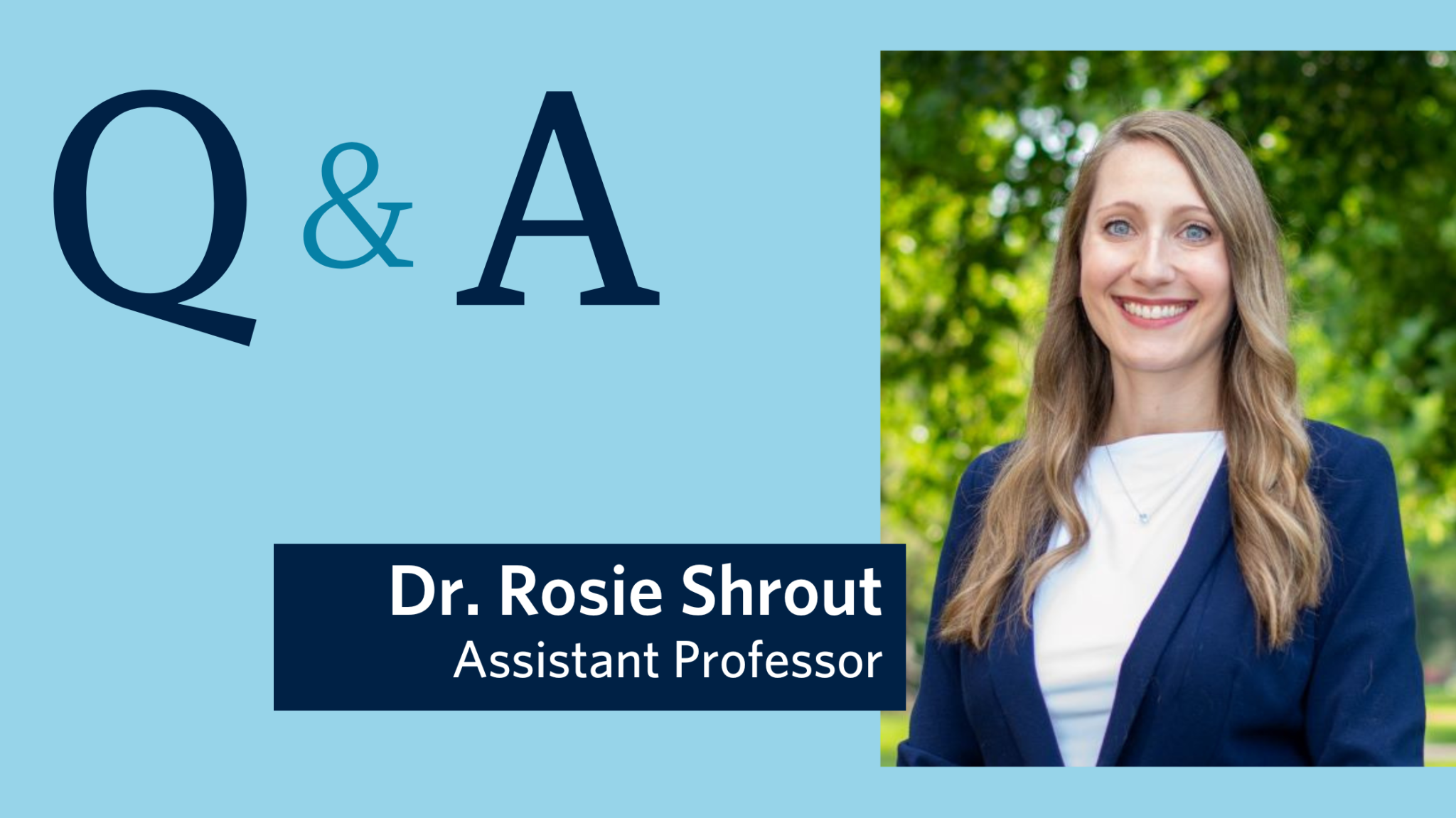Rosie Shrout
Research Area
Education
Presidential Postdoctoral Fellow, Ohio State University
PhD, University of Nevada, Reno, 2019
MA, Towson University, 2013
BA, State University of New York at Potsdam, 2011
About
Dr. Rosie Shrout (she/her/hers) is an Assistant Professor of Psychology at the University of British Columbia. She is a social-health psychologist with specialized training in psychoneuroimmunology, dyadic methods, and behavioural medicine. Dr. Shrout studies how stress affects relationships and health, particularly among couples who are older, who have experienced infidelity, and who have breast cancer, cardiovascular disease, or concealable chronic illness. Her work has shown that couples’ relationships influence psychological, behavioural, and physical health, including the immune, endocrine, and cardiovascular systems, and the gut microbiome. Dr. Shrout’s overarching goals are to identify factors that put couples’ relationships and health at risk and to inform interventions on how couples can grow closer and stronger during turbulent times.
Dr. Shrout serves on the Editorial Boards for the Journal of Social and Personal Relationships and Personal Relationships, and the Early Career Editorial Board for Biopsychosocial Science and Medicine. Her work has been featured in prestigious outlets, including NPR, BBC, and U.S. News and World Report.
Teaching
Research
Stress is an inevitable and natural part of everyday life and relationships. Dr. Shrout’s research examines how couples manage common yet challenging stressors—conflict, chronic illness, and cancer—in ways that influence each partner’s long-term health. She is particularly interested in identifying the underlying psychological, behavioural, and biological pathways that foster each partner’s health and longevity or fuel their disease risk and early mortality. Dr. Shrout’s interdisciplinary research uses survey, ecological, and laboratory designs with physiological, daily, longitudinal, and biospecimen assessments to investigate how partners influence each other’s health.
Current projects address:
• How stress affects the immune and cardiovascular systems in breast cancer survivors and their partners
• How breast cancer survivors and their partners cope with fears of cancer recurrence and stress in daily life
• Aging couples’ emotional and physiological responses to conflict
• How individuals with concealable chronic illness talk about their illness
• How infidelity suspicion affects emotional, behavioural, and physical health in daily life
Publications
For a complete list of Dr. Shrout’s publications, please visit the Relationships and Health Lab website.
Shrout, M.R., Renna, M.E., Leonard, M.J., Friedman, E.M., & Miller, K.D. (2024). Couples in breast cancer survivorship: Daily associations in relationship satisfaction, stress, and health. Comprehensive Psychoneuroendocrinology. 20, 100261. https://doi.org/10.1016/j.cpnec.2024.100261
Shrout, M.R., Wilson, S.J., Farrell, A.K., Rice, T.M., Weiser, D.A., Novak, J.R., & Monk, J.K. (2024). Dyadic, biobehavioral, and sociocultural approaches to romantic relationships and health: Implications for research, practice, and policy. Social and Personality Psychology Compass, 18(2), e12943. https://doi.org/10.1111/spc3.12943
Shrout, M. R., Weigel, D. J., & Laurenceau, J. P. (2024). Couples and concealable chronic illness: Investigating couples’ communication, coping, and relational well-being over time. Journal of Family Psychology, 38(1), 136–148. https://doi.org/10.1037/fam0001136
Shrout, M. R., Wilson, S. J., Renna, M. E., Madison, A. A., & Kiecolt-Glaser, J.K. (2023). “We’ve got this:” Middle-aged and older couples’ satisfying relationships and we-talk promote better physiological, relational, and emotional responses to conflict. Psychosomatic Medicine, 85(2), 154-164. https://doi.org/10.1097/PSY.0000000000001162
Shrout, M. R., Black, A. E., Wilson, S. J., Renna, M. E., Madison, A. A., Kiecolt-Glaser, J. K., & Reis, H. T. (2023). How aging couples’ emotional and physiological associations change across positive, supportive, and conflictual discussions: Roles of capitalization and responsive behaviors. Biological Psychology, 177, 108500. https://doi.org/10.1016/j.biopsycho.2023.108500
Shrout, M. R., Renna, M. E., Madison, A. A., Malarkey, W.B., & Kiecolt-Glaser, J.K. (2023). Marital negativity’s festering wounds: The emotional, immunological, and relational toll of couples’ negative communication patterns. Psychoneuroendocrinology, 149, 105989. https://doi.org/10.1016/j.psyneuen.2022.105989
*Editor’s Choice Article
Shrout, M. R. (2021). The health consequences of stress in couples: A review and new integrated Dyadic Biobehavioral Stress Model. Brain, Behavior, and Immunity – Health, 16, 100328. https://doi.org/10.1016/j.bbih.2021.100328
*Outstanding Student/New Professional Paper Award, National Council on Family Relations’ Families and Health Section
Shrout, M. R., Renna, M. E., Madison, A. A., Alfano, C. M., Povoski, S. P., Lipari, A. M., Agnese, D. M., Farrar, W. B., Carson III, W. E., & Kiecolt-Glaser, J. K. (2021). Breast cancer survivors’ satisfying marriages predict better psychological and physical health: A longitudinal comparison of satisfied, dissatisfied, and unmarried women. Psycho-Oncology, 30(5), 699-707. https://doi.org/10.1002/pon.5615
*Top Cited Article in the Publishing Year, *Award for Excellence in Research about Families, Purdue University’s Center for Families
Awards
- Rising Star Award, Association for Psychological Science (2025)
- Faculty Research Development Award, Purdue University Center on Aging and the Life Course (2024)
- Kinley Trust Award, Purdue University (2023)
- Emerging Scholar Award, Society for Personality and Social Psychology (2022)
- Outstanding Student/New Professional Paper Award, National Council on Family Relations’ Families and Health Section (2022)
- KL2 Early Career Investigator Award, National Institutes of Health, Indiana Clinical and Translational Sciences Institute (2022-2024)
- Lorene Burkhart Award for Excellence in Research about Families, Purdue University’s Center for Families (2022)
- Editor’s Choice Article, Psychoneuroendocrinology (2020, 2023)
- Young Scholar Award, American Psychosomatic Society (2020)
- Most Outstanding Graduate Student Researcher, University of Nevada, Reno Graduate Student Association (2019)
Graduate Supervision
Dr. Shrout is accepting applications for graduate students in the Health Psychology program.


